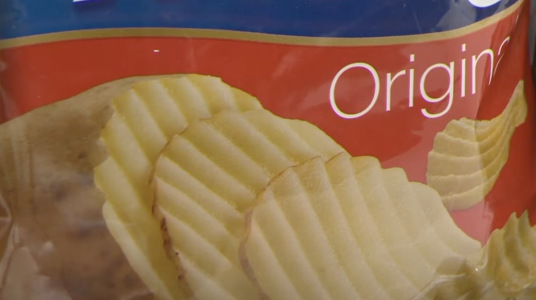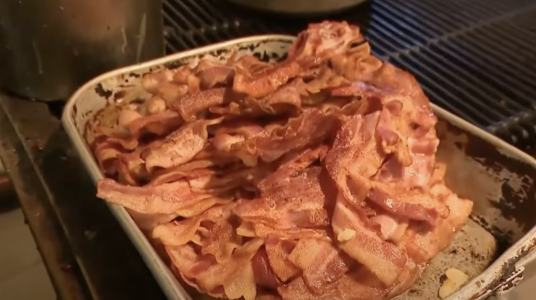Is your favorite food increasing your colon cancer risk? Shocking new study reveals the truth!
- Replies 0
Is your pantry packed with chips, breakfast cereals, and that irresistible tub of ice cream?
You’re not alone—these ultra-processed foods have become staples in many American households, especially as convenience and taste often win out over nutrition.
But a new study from the University of South Florida (USF) is sounding the alarm: these popular foods may be doing more than just expanding your waistlines—they could be quietly increasing your risk of colon cancer.Let’s dig into what this means for you, your health, and your next trip to the grocery store.
Colon Cancer: The Silent Threat
Colorectal cancer is the second-leading cause of cancer-related deaths in the United States. While genetics and age play a role, mounting evidence suggests that what we eat is just as important.
The latest research, published in the respected journal Gut, points a finger at ultra-processed foods and certain seed oils as culprits that may suppress our immune system, trigger inflammation, and make it harder for our bodies to fight off cancer cells.
What Exactly Are Ultra-Processed Foods?
If you’re picturing a bag of chips or a frosted doughnut, you’re on the right track.
Ultra-processed foods are industrial creations, often loaded with additives, preservatives, artificial flavors, and unhealthy fats. They’re designed to be convenient, tasty, and shelf-stable—but not necessarily good for you.

Here are some common examples USF researchers highlighted:
- Ice cream
- Sausages and processed meats
- Potato chips and other salty snacks
- Mass-produced breads
- Sugary breakfast cereals
- Doughnuts and pastries
- Soda and other sugary drinks
- Instant soups and noodles
- Some alcoholic beverages
But the list doesn’t stop there. If it comes in a box, bag, or can and has a long list of ingredients you can’t pronounce, it’s probably ultra-processed.
Also read: Do seniors get special discounts at Costco? Here’s what you need to know
How Do These Foods Harm Us?
According to Dr. Ganesh Halade, associate professor at the USF Health Heart Institute, our bodies are designed to resolve inflammation naturally—if we give them the right fuel.
Healthy fats, like those found in avocados and wild-caught fish, help our bodies produce bioactive compounds that fight inflammation.
But when our diets are dominated by ultra-processed foods and seed oils (think soybean, corn, and sunflower oil), this natural defense system gets overwhelmed.
The result? Chronic inflammation, a weakened immune response, and a higher risk of cancer cell growth.
Source: CBS Boston / Youtube.
The Bigger Picture: More Than Just Colon Cancer
This isn’t the first time ultra-processed foods have been linked to cancer.
Previous studies have shown that just a 10% increase in ultra-processed food consumption can raise the risk of breast cancer deaths by 16% and ovarian cancer deaths by a staggering 30%.
The evidence is stacking up: what we eat matters, perhaps more than we ever realized.
What Should We Eat Instead?
The good news is that you don’t have to overhaul your entire diet overnight. Small, consistent changes can make a big difference.
Also read: Breakthrough in prostate cancer treatment: What every patient needs to know about this game-changing discovery
USF researchers recommend focusing on whole, unprocessed foods rich in omega-3 fatty acids and other nutrients that help your body fight inflammation.
Here are some top picks:
- Fatty fish like salmon, halibut, and sardines
- Seaweed and leafy greens like spinach
- Grass-fed and pasture-raised meats
- Avocados, walnuts, and flaxseeds
Not only do these foods support your immune system, but they also taste great and can be prepared in countless delicious ways.

The Future of Cancer Prevention: Food as Medicine
Perhaps the most exciting part of the USF study is the potential for food—not just pharmaceuticals—to play a starring role in cancer prevention and treatment.
Early trials using fish oil derivatives have shown promise in tackling inflammation at its source.
As Dr. Timothy Yeatman, a corresponding author of the study, puts it: “This has the potential to revolutionize cancer treatment, moving beyond drugs to harness natural healing processes.”
Read next: Butt seriously: Experts share the best way to wipe

Have you noticed a difference in your health after cutting back on processed foods? Do you have any favorite recipes or tips for eating more whole foods? Or maybe you have questions about how to make these changes work for your lifestyle? Share your thoughts, experiences, and questions in the comments below!
You’re not alone—these ultra-processed foods have become staples in many American households, especially as convenience and taste often win out over nutrition.
But a new study from the University of South Florida (USF) is sounding the alarm: these popular foods may be doing more than just expanding your waistlines—they could be quietly increasing your risk of colon cancer.Let’s dig into what this means for you, your health, and your next trip to the grocery store.
Colon Cancer: The Silent Threat
Colorectal cancer is the second-leading cause of cancer-related deaths in the United States. While genetics and age play a role, mounting evidence suggests that what we eat is just as important.
The latest research, published in the respected journal Gut, points a finger at ultra-processed foods and certain seed oils as culprits that may suppress our immune system, trigger inflammation, and make it harder for our bodies to fight off cancer cells.
What Exactly Are Ultra-Processed Foods?
If you’re picturing a bag of chips or a frosted doughnut, you’re on the right track.
Ultra-processed foods are industrial creations, often loaded with additives, preservatives, artificial flavors, and unhealthy fats. They’re designed to be convenient, tasty, and shelf-stable—but not necessarily good for you.

A new study from the University of South Florida has linked diets high in ultra-processed foods and seed oils to an increased risk of colorectal (bowel) cancer, due to their role in suppressing the immune system and causing inflammation. Image source: CBS Boston / Youtube.
Here are some common examples USF researchers highlighted:
- Ice cream
- Sausages and processed meats
- Potato chips and other salty snacks
- Mass-produced breads
- Sugary breakfast cereals
- Doughnuts and pastries
- Soda and other sugary drinks
- Instant soups and noodles
- Some alcoholic beverages
But the list doesn’t stop there. If it comes in a box, bag, or can and has a long list of ingredients you can’t pronounce, it’s probably ultra-processed.
Also read: Do seniors get special discounts at Costco? Here’s what you need to know
How Do These Foods Harm Us?
According to Dr. Ganesh Halade, associate professor at the USF Health Heart Institute, our bodies are designed to resolve inflammation naturally—if we give them the right fuel.
Healthy fats, like those found in avocados and wild-caught fish, help our bodies produce bioactive compounds that fight inflammation.
But when our diets are dominated by ultra-processed foods and seed oils (think soybean, corn, and sunflower oil), this natural defense system gets overwhelmed.
The result? Chronic inflammation, a weakened immune response, and a higher risk of cancer cell growth.
Source: CBS Boston / Youtube.
The Bigger Picture: More Than Just Colon Cancer
This isn’t the first time ultra-processed foods have been linked to cancer.
Previous studies have shown that just a 10% increase in ultra-processed food consumption can raise the risk of breast cancer deaths by 16% and ovarian cancer deaths by a staggering 30%.
The evidence is stacking up: what we eat matters, perhaps more than we ever realized.
What Should We Eat Instead?
The good news is that you don’t have to overhaul your entire diet overnight. Small, consistent changes can make a big difference.
Also read: Breakthrough in prostate cancer treatment: What every patient needs to know about this game-changing discovery
USF researchers recommend focusing on whole, unprocessed foods rich in omega-3 fatty acids and other nutrients that help your body fight inflammation.
Here are some top picks:
- Fatty fish like salmon, halibut, and sardines
- Seaweed and leafy greens like spinach
- Grass-fed and pasture-raised meats
- Avocados, walnuts, and flaxseeds
Not only do these foods support your immune system, but they also taste great and can be prepared in countless delicious ways.

Healthy, unprocessed foods like salmon, spinach, seaweed, and grass-fed meats are recommended to help fight inflammation and reduce cancer risk. Image source: CBS Boston / Youtube.
The Future of Cancer Prevention: Food as Medicine
Perhaps the most exciting part of the USF study is the potential for food—not just pharmaceuticals—to play a starring role in cancer prevention and treatment.
Early trials using fish oil derivatives have shown promise in tackling inflammation at its source.
As Dr. Timothy Yeatman, a corresponding author of the study, puts it: “This has the potential to revolutionize cancer treatment, moving beyond drugs to harness natural healing processes.”
Read next: Butt seriously: Experts share the best way to wipe
Key Takeaways
- A new study from the University of South Florida has linked diets high in ultra-processed foods and seed oils—such as chips, ice cream, and mass-produced bread—to an increased risk of colorectal (bowel) cancer, due to their role in suppressing the immune system and causing inflammation.
- Healthy, unprocessed foods like salmon, spinach, seaweed, and grass-fed meats are recommended to help fight inflammation and reduce cancer risk, with researchers noting the possible benefits of omega-3 fatty acids found in these foods.
- The study suggests that ultra-processed foods have previously been linked to greater risks of other cancers as well, with a notable increase in breast and ovarian cancer deaths seen in past research as processed food intake goes up.
- Early trials using fish oil derivatives are showing promise in targeting inflammation at its root cause, with researchers optimistic that focusing on diet and natural healing could play a revolutionary role in preventing and treating cancer in the future.
Have you noticed a difference in your health after cutting back on processed foods? Do you have any favorite recipes or tips for eating more whole foods? Or maybe you have questions about how to make these changes work for your lifestyle? Share your thoughts, experiences, and questions in the comments below!






